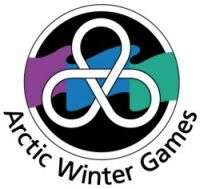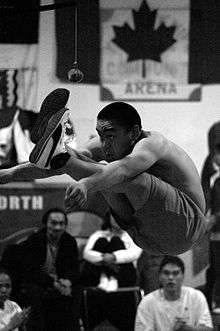Arctic Winter Games
 Arctic Winter Games Logo | |
| First event | 1970 in Yellowknife, Northwest Territories, Canada |
|---|---|
| Occur every | 2 years |
| Purpose | Sports for the Arctic |
| President | Gerry Thick |
| Website | ArcticWinterGames.org |

The Arctic Winter Games is an international biennial celebration of circumpolar sports and Aboriginal culture.
Background
The Arctic Winter Games were founded in 1969 under the leadership of Governor Walter J. Hickel of Alaska, Stuart M. Hodgson, Commissioner of the Northwest Territories, and Yukon Commissioner James Smith. The idea to "provide a forum where athletes from the circumpolar North could compete on their own terms, on their own turf" came from Cal Miller, an advisor with the Yukon team at the 1967 Canada Winter Games.
In 1970 in Yellowknife, Canada, 500 athletes, trainers and officials came together for the first Arctic Winter Games. The participants came from the Northwest Territories, Yukon and Alaska. Since then, the Games have been held on fifteen occasions in different places and with ever more participants from more and more places within the Arctic region. The games in 2002 were the first jointly hosted Arctic Winter Games, by Nuuk, Greenland and Iqaluit, Nunavut.
Sports disciplines
Games include:[1]
- Alpine Skiing
- Arctic Sports & Dene Games
- Badminton
- Basketball
- Biathlon
- Cross Country Skiing
- Curling
- Dog Mushing
- Figure Skating
- Gymnastics
- Ice hockey
- Indoor Soccer
- Snowboarding
- Snowshoe Biathlon
- Snowshoe running
- Speed Skating
- Volleyball
- Wrestling
Participants
A total of nine contingents participated in the Arctic Winter Games. The same group of teams also made up the participants of the previous games [2]
- Alaska, United States
- Greenland, Denmark
- Northern Alberta, Canada
- Northwest Territories, Canada
- Nunavik, Quebec, Canada
- Nunavut, Canada
- Sami people, Sápmi (Norway, Sweden, Finland, Kola Peninsula of Russia)
- Yamalo-Nenets Autonomous Okrug, Russia
- Yukon, Canada
Host cities
Host cities have mostly been in Canada and the United States.
| Year | Host City | Country |
|---|---|---|
| 1970 | Yellowknife | |
| 1972 | Whitehorse | |
| 1974 | Anchorage | |
| 1976 | Schefferville | |
| 1978 | Hay River/Pine Point | |
| 1980 | Whitehorse | |
| 1982 | Fairbanks | |
| 1984 | Yellowknife | |
| 1986 | Whitehorse | |
| 1988 | Fairbanks | |
| 1990 | Yellowknife | |
| 1992 | Whitehorse | |
| 1994 | Slave Lake | |
| 1996 | Chugiak/ Anchorage | |
| 1998 | Yellowknife | |
| 2000 | Whitehorse | |
| 2002 | Nuuk | |
| Iqaluit | ||
| 2004 | Wood Buffalo | |
| 2006 | Kenai Peninsula Borough | |
| 2008 | Yellowknife | |
| 2010 | Grande Prairie | |
| 2012 | Whitehorse | |
| 2014 | Fairbanks | |
| 2016 | Nuuk | |
| 2018 | Hay River/Fort Smith |
Hodgson Trophy
The Hodgson trophy for fair play and team spirit is awarded at the end of every games. The trophy is named for Stuart Milton Hodgson, former Commissioner of the Northwest Territories.[5]
The past winners of the trophy are:[5]
| Winner | Year |
|---|---|
| 1978 | |
| 1980-1988 | |
| 1990 | |
| 1992 | |
| 1994 | |
| 1996 | |
| 1998 | |
| 2000 | |
| 2002 | |
| 2004 | |
| 2006 | |
| 2008 | |
| 2010 | |
| 2012 | |
| 2014 | |
| 2016 | |
| 2018 |
Arctic Winter Games International Committee
- Gerry Thick, President
- Wendell Shiffler, Vice President
- Lloyd Bentz, Secretary
- Ian Legaree Technical Director
- Jens Brinch
- Sharon Clarkson
- Marilyn Neily
- John Rodda
- Don Sian
- Karen Thomson
Arctic Winter Games alumni
- The Governor General of Canada, Michaëlle Jean, presented Aisa Pirti, a 19-year-old Inuk from Akulivik, Nunavik, with the National Aboriginal Role Model Award during a ceremony at Rideau Hall. Aisa has received 30 medals and five trophies for Inuit games in regional and circumpolar competitions, such as the Arctic Winter Games and the Eastern Arctic Summer Games.
See also
References
- ↑ "2000 Arctic Winter Games Results", ArcticWinterGames.org.
- ↑ Arctic Winter Games International Committee (2006). "Medal standings". Archived from the original on 2 February 2007. Retrieved 2007-03-01.
- ↑ "Arctic Winter Games 2016 – Grønland". Kommuneqarfik Sermersooq (in Danish). 3 March 2012. Retrieved 5 March 2012.
- ↑ "Hay River, Fort Smith to jointly host 2018 Arctic Winter Games". CBC. 18 March 2015. Retrieved 9 April 2015.
- 1 2 "The Hodgson Trophy", ArcticWinterGames.org.